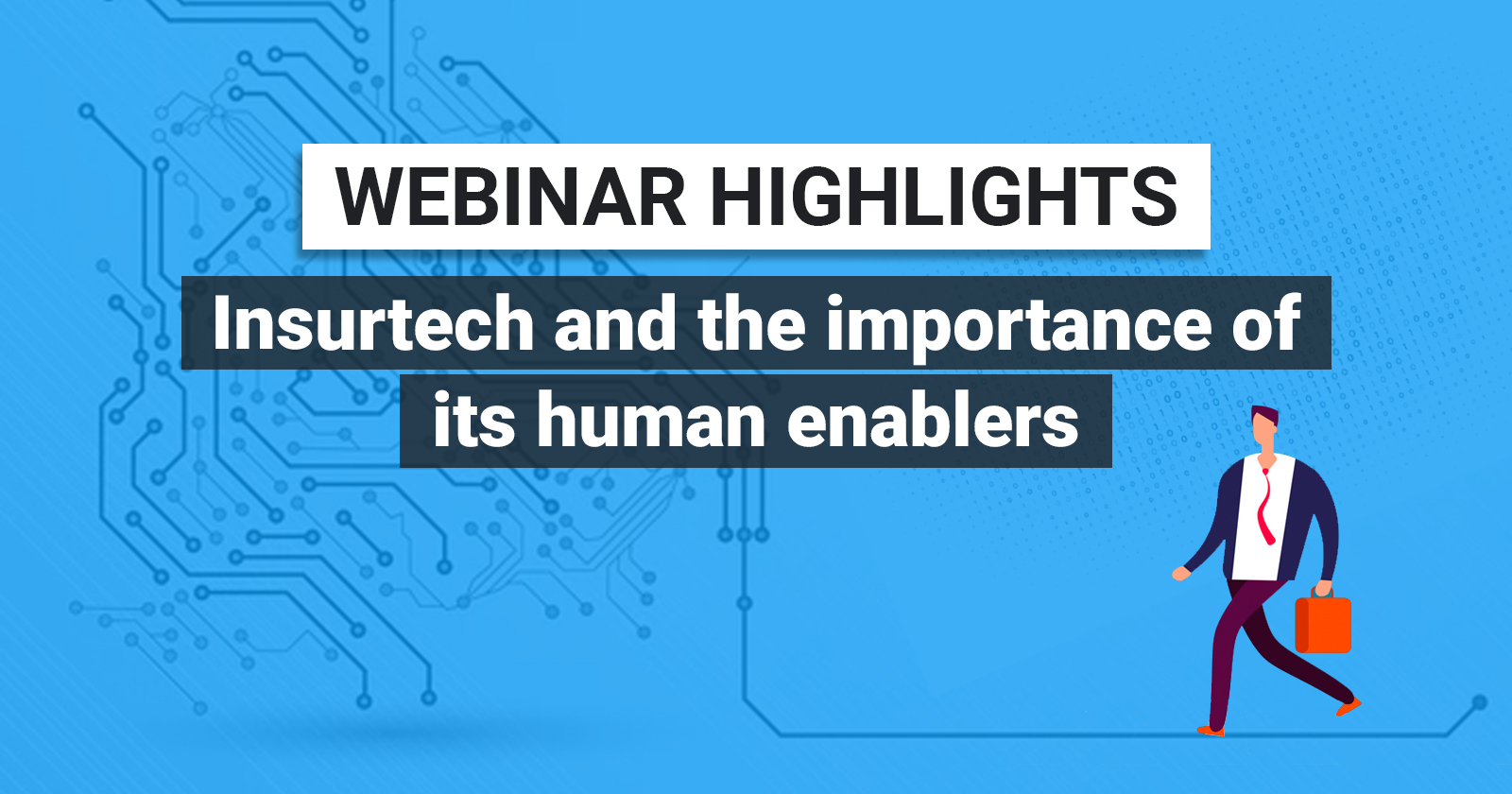
Thank you to all who attended this webinar which was recently concluded on 24 March ‘22; our first for the year! For those who missed the webinar, as always, here’s an article that summarises the key points of the webinar. The webinar was broken down into the following segments: The webinar kicked off with the sharing of a couple of articles about insurance and technology with the goal of introducing the overall theme of human enablers in the midst of digital transformation and more importantly, where the industry stands on this. Article referenced: 2022 insurance industry outlook Article referenced: How Agents and Insurtechs Can Work Together Article referenced: 5 reflections on the insurance industry in 2021 Article referenced: Embracing the Human Side of the Bionic Insurer The key takeaway that was shared from the above articles was that human enablers, and specifically, intermediaries, play a more important role now, more than ever. The speaker then went into sharing about the value intermediaries create and how this relates back to the previous segment about the importance of human enablers. Rather surprisingly, the segment kicked off with a rather stark question; why not cut out the intermediaries? The speaker then shared that intermediaries cannot be cut out because The speaker than went on to call out some of the key value that intermediaries bring to the table: The speaker then shared that essentially, the human advisor is still highly important as insurance is not something that can be easily grasped or understood. And went on to give two sets of reasoning for such. The first being that insurance is something our brains are tuned to ‘look away’ from and it requires proactivity – fear and optimism bias essentially. On optimism bias, it was shared that our brain is built to be optimistic as a default; we will first believe that we are less likely to suffer from misfortune and more likely to attain success. As such it could be one of the reasons why the industry always say ‘insurance requires selling’ – there is a built-in resistance to purchasing / or being motivated to purchase Insurance. On fear, it was shared that the brain is trained to be more afraid of what we can understand, rather than one that seems foreign or abstract. So, how we fear or how we have learnt to ‘prioritise’ fear can explain some of the resistance to Insurance; how I die seems to take higher priority over dying itself. As such, and arguably, hosplitalisation plans are therefore easier to sell than for example, general insurance. Essentially, technology will not be able to replace the ‘spark’ to get clients to think about insurance proactively. The speaker then shared that clients do want to speak to an advisor FOR THE RIGHT REASONS – to be advised not sold. A couple of key stats from this survey/research was shared: The speaker then went on to share that to understand how tech can be leveraged, we must first understand what the key pain points were. It was then shared that based on a Surer survey, the following were the top ones: It was then shared that tech can help on 3 fronts to solve the above pain points: digitalisation, automation and collaboration. The speaker than further expanded by sharing the following: Technology is here to help with removing administrative pain points and manual, repetitive tasks. It is here to help parties leverage each other’s ‘super-powers’ to scale business together and serve clients better. With more bandwidth, intermediaries can now become that advisor with a client-first mindset that clients want! This segment was split into two parts, customer interaction and interpersonal skills of a human enabler On customer interaction, it was shared that On interpersonal skills, it was shared that When you are proactive in getting and acting on feedback, you derive further value for yourself and the client. When doing so, remain transparent and open. Follow up and show your clients that you care and always be ready to help, even when it is not about closing a deal Tech is here to remove administrative barriers, so you have time! — Thank you to those who took time out to join us at the webinar. We hope it was a fruitful session for you. For those who are reading our highlights because you couldn’t make it, we hope this article gave you a good summary of the content shared! Subscribe to our Telegram channel or stay tuned to our Facebook or LinkedIn pages to get updates on more of such initiatives! It is fuss-free. No credit card or payment required.Key highlights
Case studies: how the industry is viewing ‘human enablers’
The value an intermediary creates
*research done by Zurich and Google | ^research by the Insurance Information Institute
Intermediaries provide customers with the necessary information required to make educated purchases/ informed decisions. Intermediaries are there to explain what their clients need, and the options available to them.
Intermediaries act as the person with the knowledge to get the client started. Without a wholesome knowledge of the insurance industry, it is hard to even get going to do research OR trust the research you have done; essentially, clients don’t know what they don’t know. Intermediaries know their clients’ risks, the insurers willing to cover those risks and the best way to secure that coverage!
Clients may know what risks they want to cover but do not have a wide overview of the right insurer. The Insurer may have all the information in the market but are ultimately in a tough position to fully understand the prospective client. Enter the intermediary – someone who knows the marketplace, knows where to get answers to questions, and knows what information is required on both sides.What technology cannot do
What can tech help with in your business?
Clients lean on you for expert advice; someone who has our best interest at heart. Intermediaries should not be bogged down by repetitive administrative matters. A case study on Surer’s partnership with Markel was shared to demonstrate this point.
Packaged products are essentially, by design, policies built to cover a generalised representation of the risk rather than the specifics of the policyholder’s business. Imagine a world where the effort to get your clients exactly what they need vs pushing them packages is the same. Customisation can be mentioned in the same breath as scalability and ease of distribution. Technology is here to help unlock this shift; to enable disbursement of bespoke policies. Similarly, a case study of Surer’s partnership with FWD was shared to demonstrate this point.
A product or service aims to solve a problem for a client and the client in turn, pays for this product or service. A successful intermediary should strive to help their clients find the best solution to their problem. Tech helps you do this more simply – for e.g. sourcing for multiple quotes / working with multiple parties to find the best cover.Important skills of a human enabler powered by tech
Responding to your clients and show that you understand their situation. If a client has just suffered a personal tragedy, would you end your conversation with a sign-off that says ‘Cheers!’? Similarly, would you harry your clients and talk business if they are in a difficult period?
Clients of the near future will understand that digital platforms are still ‘pre programmed’. So, when they interact with a human, they expect the human to be exactly that! Bots are pre-programmed and follow a set of Y and N logic. The human can exercise flexibility and empathy within the context of the situation
Even with a wealth of resource online, the client first needs to know what they want to search for or understand before they can find the answers. But they do not know what they don’t and this is where the human enabler can step in to dig deeper on the needs and provide advice thereafter.
Nothing is more valuable than feedback; if taken onboard with the right mindset. When the client takes the time to give you their feedback, be sure to set expectations and then walk the talk! Not everything can be fulfilled, but if you are able to set expectations and then stick to whatever commitments, it really will go a long way.
A big element of delighting a client is when they least expect it. This does not always have to material, and in the form of gifts and discounts. You can add value in many ways that does not require huge investments (remember our webinar on content creation?) Something as simple as a thank you letter, text or email can go a long way in building goodwill.
This is where intermediaries are the most reassuring to their clients. Help the client get more clarity on the process – you will come across as a pillar of assurance that things will be okay. Help the client problem solve or help them make decisions with confidence.Are you an Insurance intermediary? Sign up for free now!
Subscribe to our Telegram channel to get the most insightful articles delivered to you automatically!
